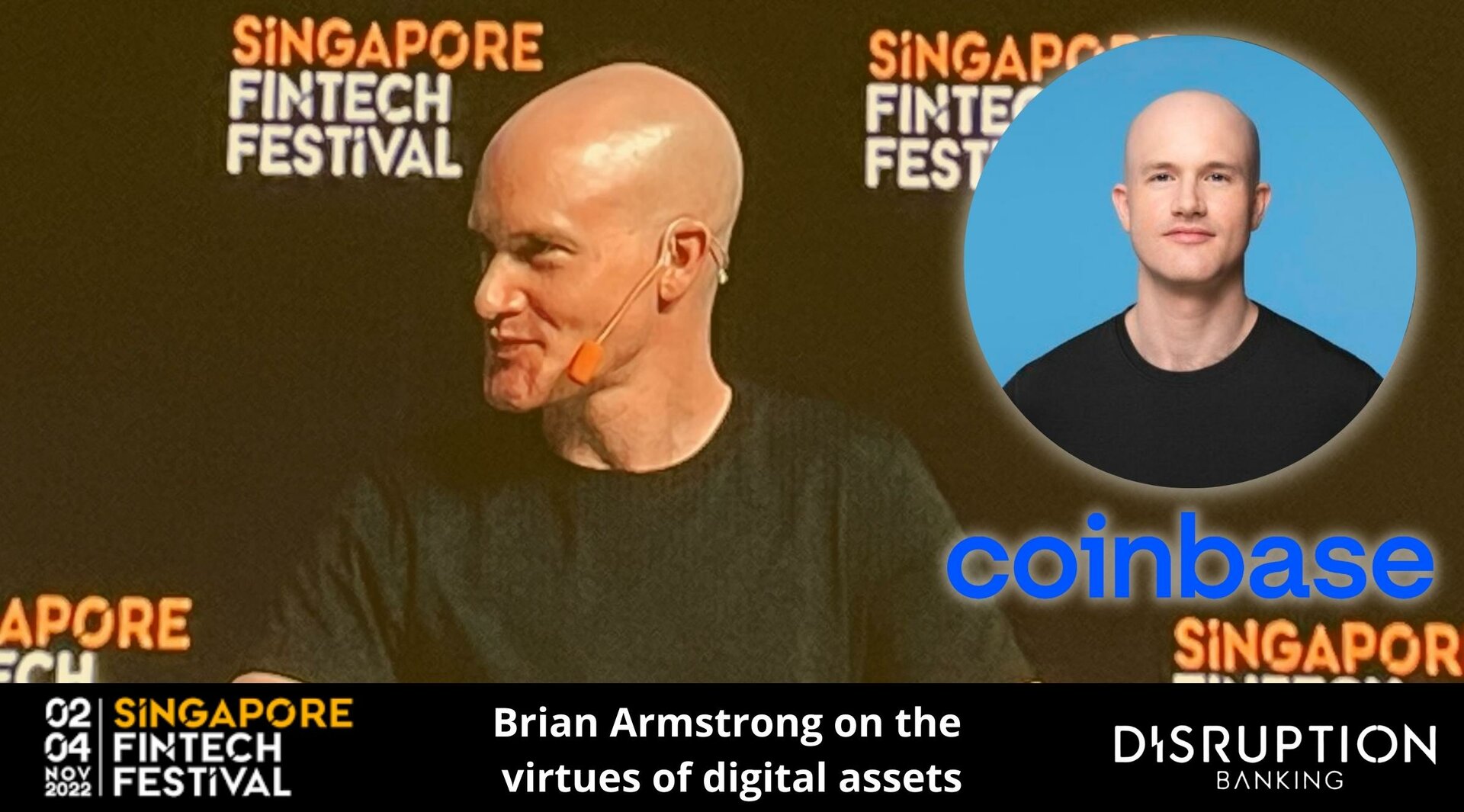“A more fair and free global financial system that’s being built.” That’s how Coinbase’s CEO Brian Armstrong described the crypto economy at the Singapore Fintech Festival. He used the occasion to outline some of the key benefits he believes crypto offers to both retail and institutional investors worldwide, and offered some predictions as to how innovation will continue to progress.
Coinbase’s Brian Armstrong speaking at #SFF2022. He sees crypto developing in three stages: from being an investment vehicle, to providing financial services, to offering set of applications that aren’t financially related at all. pic.twitter.com/JIv3dSaCvm
— #DisruptionBanking (@DisruptionBank) November 4, 2022
Financial Inclusion
One area which Armstrong emphasised was that of financial inclusion – and specifically, that crypto “is not for the 1%.” He outlined that Coinbase has over 100 million verified users worldwide, and while “the average demographic is a 25-35 year old, tech savvy person,” the platform attracts all kinds of users. Armstrong argued that 1.7 billion people have absolutely no access to financial infrastructure or bank accounts, “and they can benefit from crypto the most, perhaps.” More widely, he believes that crypto can serve as “a tool for economic freedom” that includes people in a fairer economy, with strong property rights and free trade. Over time, Armstrong thinks that its use-cases will continue to expand, until we’re operating in an entirely new, crypto-driven economy. He estimates that, already, over half of activity is not linked to speculative trading.
A broad recession
Armstrong was in conversation with Sopnendu Mohanty, the Chief Fintech Officer at the Monetary Authority of Singapore (MAS), and therefore was required to defend crypto against some of the regulator’s concerns. Mohanty pointed out that, particularly this year, retail users have been exposed to significant losses. Armstrong argued, however, that “[stocks like] Netflix and Spotify have come down 80% – these are regulated, approved assets. I think we’re in a broad macro recession, this isn’t a crypto specific thing.”
While he welcomed the possibility of better consumer protections, appropriate disclosures, and the regulation of centralised exchanges and custodians, Armstrong thinks it’s important not too unfairly scapegoat crypto products. This chimes with what Amber Group’s Annabelle Huang told #DisruptionBanking earlier in our recent feature:
While #crypto prices are down this year, almost every asset class has experienced declines. “Crypto is trading in line with risk assets, which are moving in the opposite direction of where rates are. That’s a result of the liquidity available."https://t.co/ieZw7kLRGC
— #DisruptionBanking (@DisruptionBank) November 4, 2022
Crypto and Web3
From a regulatory perspective, Singapore is in an interesting place when it comes to crypto. It has accepted, indeed encourages, the institutional trading of crypto and use of stablecoins. But it’s very hesitant in allowing retail users to trade digital assets. Armstrong thinks this is a mistake. “People want to trade but they also want to do all these other things,” he said. “They want to do peer-to-peer payments, remittance, they want to do commerce. They want to get yield on their assets, they want to be borrowing, lending, and, increasingly in the future, they’re going to want to do things that aren’t even related to financial services at all. Like having a decentralised identify or artwork, through NFTs, the metaverse, and DeFi.” Singapore openly aims to be at the forefront of all these innovations. But to be a leader in Web3, while sceptical on crypto, is “incompatible,” according to Armstrong. He wants Singapore “to embrace retail trading and self-hosted wallets.”
Regulation
Unlike other major cryptoexchanges, Coinbase is fully regulated, hence why it’s been able to list in the US. Armstrong thinks that centralised exchanges and custodians should be regulated in the same way as any other financial services company. They should be subject to anti-money laundering protections, auditing, and relevant disclosures to customers. However, for crypto service providers that don’t touch client funds, such as self-hosted wallets, Armstrong thinks a different approach is required. “If you’re not taking possession of customer funds, then I don’t believe you should be regulated as a financial services business. You might be a software business or something else. And similarly with DeFi. These are decentralised protocols; somebody could publish a protocol and it’s being used by people all over the world, but they’re never taking custody of customer funds. To somehow require people participation to be treated like a financial service business will kill the benefit of this.”
Armstrong ended on a note of optimism. He thinks that “we’re living in a golden age of software innovation” and that the brightest minds in science and technology are working to solve some of the world’s major problems. In his mind, crypto is one of these innovations that’s a “force for good.”
“For-profit companies can do a lot of good in the world.”
Author: Harry Clynch
#SFF2022 #Coinbase #Crypto #DigitalAssets #Regulation














